Diplomatic Bluebook 2018
Chapter 2
Japan's Foreign Policy that Takes a Panoramic Perspective of the World Map
1 East Africa Region
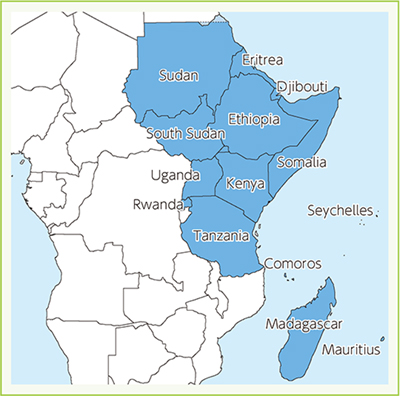
(1) Uganda
Under President Museveni's long-serving administration since 1986, Uganda has enjoyed sustained economic growth thanks partly to stable domestic politics, and has contributed to regional stability as an important and influential actor in East Africa. There are more than one million South Sudanese refugees sheltering in the northern part of the country and the burden of this on the Government of Uganda is increasing. In June, the Refugee Solidarity Summit was held in Uganda, cohosted by UN Secretary General Guterres and President Museveni, and Japan's State Minister for Foreign Affairs Kishi participated in this meeting.
During the TICAD Ministerial Meeting held in Mozambique in August, Foreign Minister Kono had a meeting with Minister of Foreign Affairs Kutesa and affirmed the friendly relations between the two countries.
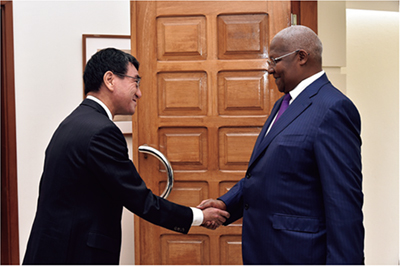 Japan-Uganda Foreign Ministers' Meeting (August 25, Maputo, Mozambique)
Japan-Uganda Foreign Ministers' Meeting (August 25, Maputo, Mozambique)(2) Ethiopia
With more than 100 million citizens, Ethiopia has the largest population in the East Africa region. Ethiopia plays an important political role in the region and is home to the headquarters of the African Union (AU), and also holds the presidency of the Intergovernmental Authority on Development (IGAD), an organization consisting of eight East African countries. Ethiopia is currently serving as a non-permanent member of the UN Security Council for a two-year period beginning in January 2017. On the economic front, Ethiopia has been enjoying sustained robust economic growth, and is aiming to become a middle-income country.
Foreign Minister Kono visited Ethiopia in August and held talks with Minister of Foreign Affairs Workneh. The two ministers held a telephone conference after North Korea conducted a nuclear test in September. Also, in November, State Minister for Foreign Affairs Sato visited Ethiopia. Ethiopia's Deputy Prime Minister Demeke visited Japan in June and made a courtesy call to Prime Minister Abe and affirmed the strengthening of friendly bilateral ties.
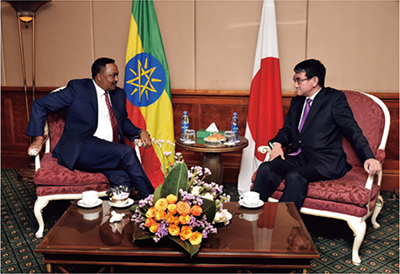 Japan-Ethiopia Foreign Ministers' Meeting (August 27, Ethiopia)
Japan-Ethiopia Foreign Ministers' Meeting (August 27, Ethiopia)(3) Kenya
Kenya, which is the gateway to East Africa, is an economic leader in the region and is a key country in the “Free and Open Indo-Pacific Strategy.” In 2017 President Kenyatta was reelected.
In May, Cabinet Secretary of Foreign Affairs Amina paid a courtesy call to Prime Minister Abe and held talks with Foreign Minister Kishida during her visit to Japan. Dr. Amina also held talks with Foreign Minister Kono during the TICAD Ministerial Meeting in August. The entry into force of the Japan-Kenya investment agreement is a leading example which shows the close relations between the two countries.
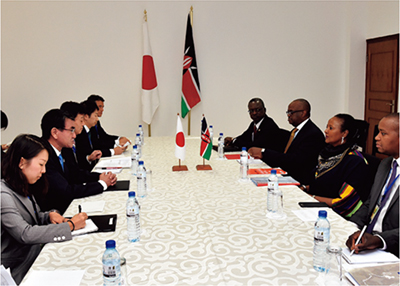 Japan-Kenya Foreign Ministers' Meeting (August 25, Maputo, Mozambique)
Japan-Kenya Foreign Ministers' Meeting (August 25, Maputo, Mozambique)(4) Djibouti
Djibouti, situated at one of the great trade arteries that passes through the Indian Ocean and connects Europe and Asia, is aiming to become a distribution hub of East Africa. It is a base for international security and is a key country in the “Free and Open Indo-Pacific Strategy.”
Since 2011, Djibouti has been hosting the installations of the Japan Self-Defense Forces to carry out antipiracy activities, and the two countries have been developing very good relations. During the TICAD Ministerial Meeting in August, Foreign Minister Kono held talks with Minister of Foreign Affairs and International Cooperation Youssouf and affirmed the intention of further strengthening their bilateral ties.
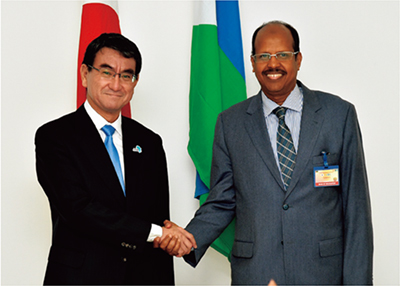 Japan-Djibouti Foreign Ministers' Meeting (August 25, Maputo, Mozambique)
Japan-Djibouti Foreign Ministers' Meeting (August 25, Maputo, Mozambique)(5) Somalia
International community including Japan is supporting Somalia's nation building efforts to recover from the civil war. A new president was elected in February, and the London Somalia Conference was held in May. Although Al Shahab (AS) remains active and humanitarian crises resulting from the impact of droughts still remain to be solved, the efforts are being made to stabilize the security and to achieve economic growth.
In February, State Minister for Foreign Affairs Kishi held talks with Deputy Prime Minister Arte. In May, Parliamentary Vice-Minister for Foreign Affairs Takei held talks with Minister of Foreign Affairs and International Cooperation Yusuf-Garaad. In September, Special Advisor to the Prime Minister Sonoura also held talks with Minister Yusuf-Garaad.
(6) Sudan
Sudan plays an important role in the stability of the East Africa region, including that of South Sudan. Given the improving security situation in Sudan's Darfur region, the UNAMID, the joint peacekeeping operation by the UN and the African Union, is currently in the process to scale down its forces. In October, the U.S. lifted its economic sanctions against Sudan, and relations with countries in Europe and Northern America are improving.
During the TICAD Ministerial Meeting in August, Parliamentary Vice-Minister for Foreign Affairs Manabu Horii held talks with Minister of State for Foreign Affairs Atta El Manan, affirming the intention to strengthen bilateral relations.
(7) Tanzania
Tanzania enjoys stable politics and economic growth. It has the second largest population in the East Africa Region (over 57 million). Over the last ten years it has maintained a high growth rate, and private companies in the country have been garnering attention as vibrant trading partners and investment destinations. The country's domestic affairs has remained stable since its independence and has contributed to peace and stability in the African Great Lakes Region by, for example, hosting a large number of refugees from neighboring countries over a long period of time.
Negotiations toward a Japan-Tanzania investment treaty are currently underway, and the fourth meeting on the issue was held in September.
(8) Madagascar
Madagascar is an island in the Indian Ocean near southeastern Africa. It is rich resources and is one of the key countries in the “Free and Open Indo-Pacific Strategy.”
With regard to relations with Japan, the Japan-Madagascar Public-Private Infrastructure Meeting was held in July. In December, President Rajaonarimampianina visited Japan and held a summit meeting in Japan. Minister of Foreign Affairs Rabary-Njaka, who accompanied the President, also held talks with Foreign Minister Kono, affirming the intention to strengthen bilateral ties.
Madagascar is home to one of the world's largest integrated production for nickel and cobalt, and a Japanese company contributes to this project. The Government of Japan is providing yen loans to support the extension project of the Toamasina Port, which is set to become the country's largest resource shipping port.
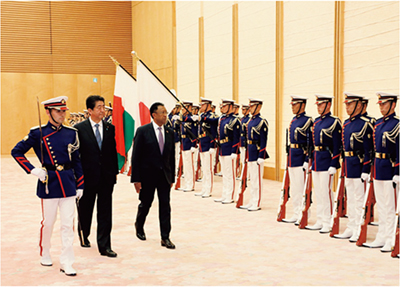 President Rajaonarimampianina reviewing the salute and attending the guard of honor ceremony during his visit to Japan (December 5, Tokyo; Photo: Cabinet Public Relations Office)
President Rajaonarimampianina reviewing the salute and attending the guard of honor ceremony during his visit to Japan (December 5, Tokyo; Photo: Cabinet Public Relations Office)(9) South Sudan
South Sudan gained independence from the Republic of the Sudan in July 2011. Although armed clashes and violent incidents are continuing in some areas away from the capital Juba, moves to resolve issues through political dialogue have become increasingly active since May. National Dialogue is making progress around the country, and in December, a meeting aimed at revitalizing 2015's Agreement on the Resolution of the Conflict in the Republic of South Sudan (ARCSS) was hosted by the Intergovernmental Authority on Development (IGAD), an organization consisting of eight East African countries.
Having withdrawn its Self Defense Force engineering unit from the UN Mission in South Sudan (UNMISS) at the end of May (the dispatch of personnel to the mission's headquarters is still ongoing), Japan is continuing to provide for and support IGAD activities and national dialogue, human resources development, humanitarian aid, etc. During the TICAD Ministerial Meeting in August, Foreign Minister Kono held talks with Minister of Foreign Affairs Deng Alor. In December, State Minister for Foreign Affairs Sato visited the capital, Juba and made a courtesy call to President Kiir and others.
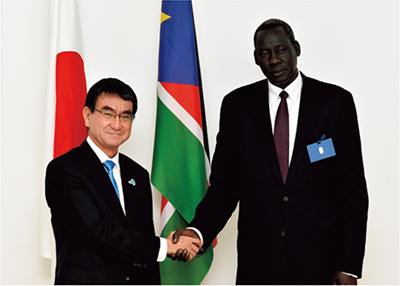 Japan-South Sudan Foreign Ministers' Meeting (August 25, Maputo, Mozambique)
Japan-South Sudan Foreign Ministers' Meeting (August 25, Maputo, Mozambique)(10) Mauritius
Mauritius is the host country of the Indian Ocean Commission (IOC) and the Indian Ocean Rim Association (IORA) secretariats, and is one of the key countries in the “Free and Open Indo-Pacific Strategy.” Mauritius is promoting diversification of its industries, with focus on the fields of IT and finance. It has maintained the highest rating amongst African countries in the World Bank's “Ease of Doing Business” rankings.
Following the opening of the Embassy of Japan in Mauritius in January, State Minister for Foreign Affairs Sonoura visited Mauritius in June, followed by State Minister of Land, Infrastructure, Transport and Tourism Suematsu in July. On these occasions, the intention to further strengthen bilateral ties including in the areas of economics and infrastructure was confirmed.
(11) Rwanda
Under the leadership of President Kagame, who took office in 2000, Rwanda has been working toward economic development and national reconciliation with the aim of recovering from the genocide which occurred in 1994. President Kagame, who was reelected in the presidential elections in August, is taking measures aimed at shifting from an agriculture-centered economy. The country is experiencing rapid growth especially in the ICT field.
During the TICAD Ministerial Meeting in August, Foreign Minister Kono held talks with Minister of Foreign Affairs, Cooperation, and the East Africa Commission Mushikiwabo.
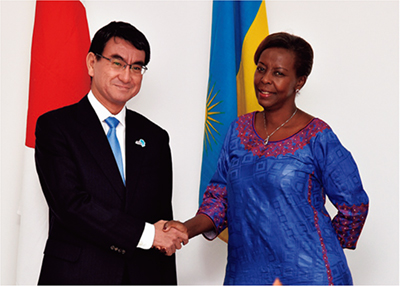 Japan-Rwanda Foreign Ministers' Meeting (August 25, Maputo, Mozambique)
Japan-Rwanda Foreign Ministers' Meeting (August 25, Maputo, Mozambique)